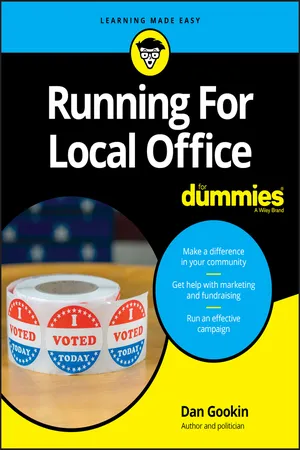
- English
- ePUB (mobile friendly)
- Available on iOS & Android
Running For Local Office For Dummies
About this book
Get ready to run for—and win—that local election!
In the land of opportunity, just about anyone who qualifies as an elector can seek public office. Some do it on a whim, some are urged to run, and some want to use their time and talents to make a difference in their local community.
If you want to know how to prepare for a run, which steps to take beforehand, and how the process goes from announcement to campaigning to election day to the swearing-in ceremony—this book has you covered.
- Find out what it's like to run for local office as a first-time candidate
- Explore the introspection required and the study necessary to make such a run effective
- Deal with marketing, fundraising, interacting with the public, and dealing with opponents
- Encourage and help others to make a run for local office
Though only one person ultimately wins a seat, nobody does it without a wide network of support. Running For Local Office For Dummies is your ticket to navigating every step on the road to winning that election.
Tools to learn more effectively

Saving Books

Keyword Search

Annotating Text

Listen to it instead
Information
Hail, Future Caesar
Who Runs for Public Office






To Be a Politician

- Politics is not a combination of the words poly, meaning “many,” and ticks, meaning “blood-sucking insects.”
- The “art of the possible” means that politics isn’t truly about doing what’s right or what’s best, but rather about just doing something.
- The Romans used the term res publica for politics. It means “the public thing.” It’s from this root that we get the word republic.
- Politics is about solving public problems. When no public problems exist, politics is about creating public problems for which no solution exists.

Avoiding public office altogether
- The First Amendment upholds your right to complain about the government. The language is to “petition the government for a redress of grievances.” This right covers everything from being abused by government power to being unhappy about a $10 fee to neuter your cat.
- See Chapter 3 for other ways you can become involved at the local level and effect change.
Understanding who wins elections
- It’s not that the public picks the worst person — it’s that the public is conditioned to vote for the lesser of two evils.
- An election is a marketing campaign. If you want to be the most popular person on the ballot, you must sell yourself. See Part 3.
Having thick skin
- Public officials have a lower bar for slander. In an election, your opponent may accuse you of minor or unspeakable acts that will offend you. In American politics, these accusations are considered fair game.

- Do you recall ever making a snide comment about a politician? You sneer, “That guy is a scumbag,” without knowing him personally or having any details. That’s how the public is trained to think of a politician.
- In a local election, especially a nonpartisan race, extreme criticism is seen as a desperate act. See Chapter 12 for details on how to deal with negative attacks.
- Criticism can be fair or unfair. It’s fair to criticize an elected official for a decision. It’s unfair to criticize someone personally, but in our culture, such criticism seems to be routine.
Resisting conformity
Table of contents
- Cover
- Table of Contents
- Introduction
- Part 1: Hail, Future Caesar
- Part 2: Before You Run
- Part 3: The Campaign
- Part 4: In Office
- Part 5: The Part of Tens
- Index
- About the Author
- Advertisement Page
- Connect with Dummies
- End User License Agreement
Frequently asked questions
- Essential is ideal for learners and professionals who enjoy exploring a wide range of subjects. Access the Essential Library with 800,000+ trusted titles and best-sellers across business, personal growth, and the humanities. Includes unlimited reading time and Standard Read Aloud voice.
- Complete: Perfect for advanced learners and researchers needing full, unrestricted access. Unlock 1.4M+ books across hundreds of subjects, including academic and specialized titles. The Complete Plan also includes advanced features like Premium Read Aloud and Research Assistant.
Please note we cannot support devices running on iOS 13 and Android 7 or earlier. Learn more about using the app